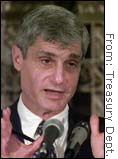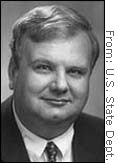NEW YORK (CNN/Money) -
When Alan Greenspan presides over a meeting of Federal Reserve policy-makers Tuesday, he will do so in what is probably the twilight of his storied tenure as chairman of the central bank.
Greenspan is likely to serve out his current four-year term as chairman, which ends June 20, and President Bush has said he will offer the 78-year-old Greenspan the chance to remain chairman until his 14-year term on the Fed board ends in February 2006.
But the tone of some of Greenspan's speeches lately have led some observers to believe he may be preparing to retire relatively soon. Beyond his usual cryptic remarks, the central bank chairman has weighed in on controversial topics such as Social Security and government-backed mortgage banks, while musing about his role in the 1990s stock-market bubble.
With that in mind, it's never too early to play the parlor game of guessing about a possible successor. In the spirit of wild-eyed speculation, then, here are some of the candidates who could fill Greenspan's shoes:
John Taylor
Ironically, one of the likeliest candidates for the job is also the least well-known. Stanford professor John Taylor, currently the Treasury under secretary for international affairs, is a star in economics circles, but a relative unknown on Wall Street.
 |
|
| John Taylor |
In 1993, Taylor came up with the "Taylor rule" for monetary policy, a formula for balancing short-term interest rates, gross domestic product, employment and inflation -- sort of a Unification Theory of central banking.
Taylor also has strong conservative credentials. He helped Bush craft his tax-cut plan and worked for President Ford, the first President Bush and former Sen. Bob Dole. He's a senior fellow at the Hoover Institution, a conservative think tank.
Bush asked Taylor to chair the White House Council of Economic Advisers (CEA), but Taylor instead chose a relatively obscure post in the Treasury Department -- a job once held, coincidentally, by previous Fed chairman Paul Volcker.
"I look upon that job as a holding operation" for a top Fed post, said former Fed Governor Andrew Brimmer, president of Brimmer & Co. in Washington.
| Related Stories
|

|
|
|
|
But Taylor's relative inexperience in the public eye could be a strike against him -- the Fed chairman must be a consummate politician, as demonstrated by Greenspan, who patiently endured interminable Congressional hearings and stuck scrupulously to his message.
"I'm not sure Taylor has the political savvy for the job," said former Fed economist Wayne Ayers, now chief economist at Fleet Boston Financial.
Robert Rubin
Right after the Sept. 11 terrorist attacks, Congress turned to two men for advice on avoiding a deep recession: Greenspan and former Treasury Secretary Robert Rubin. Many analysts believe that if John Kerry is in the White House when Greenspan leaves, Rubin would be a virtual shoo-in to replace him.
 |
|
| Robert Rubin |
But Rubin, now an executive with Citigroup Inc. (C: Research, Estimates), has opposed Bush's tax cut plans and would thus seem an unlikely choice if Bush is still in the White House when Greenspan leaves.
On the other hand, Bush could decide that a Rubin nomination would send the message that he's serious enough about the economy to risk putting a Democrat in the post.
"There have been times when Democratic presidents picked Republican Fed chairmen and vice versa," said Allen Jacobson, political analyst at Washington Analysis.
And, though he mostly avoided tarnish, Rubin could not escape being splattered a bit when the Enron mess hit the fan. Earlier this year, CNN learned Rubin had called Treasury Under Secretary Peter Fisher to discuss asking debt-rating agencies to delay downgrading Enron and that he earlier had been offered a position on Enron's board, an offer he refused.
Another former Clinton Treasury Secretary, Harvard President Lawrence Summers, is also mentioned as a potential Fed candidate in a Kerry presidency, though he is considered more politically polarizing than Rubin.
All the president's econ men
Harvard professor Martin Feldstein, head of the National Bureau of Economic Research (NBER), which sets the dates of economic recessions and expansions, is also mentioned as a possible candidate for the job.
 |
|
| Lawrence Lindsey |
But Feldstein's name is also mud in some conservative circles for disobeying President Reagan and speaking out against deficit spending when he was chairman of Reagan's CEA in the early '80s.
Other names mentioned are two former chairmen of Bush's CEA, Glenn Hubbard and Lawrence Lindsey.
Lindsey was a Fed Governor from 1991-97 and served as a dedicated supply-side economist in President Reagan's CEA. But he was a casualty of a mid-term purge of a White House economic team struggling to convey Bush's economic message.
Though his credentials are somewhat less stellar than Lindsey's, Hubbard is well respected, especially among conservatives. He also managed to survive the Bush econ-team purge, leaving the White House of his own accord last year to return to a teaching post at Columbia.
A former Clinton adviser, Columbia professor Joseph Stiglitz, is mentioned as a possible Fed candidate in a Kerry presidency. But Stiglitz was also an outspoken critic of some of Clinton's economic policies, and many of Kerry's economic advisers were part of Clinton's team.
Another Kerry adviser, Princeton professor Alan Blinder, is also mentioned as a possible candidate for Fed chairman. He was also part of Clinton's CEA and served as Fed Vice Chairman from 1994 to 1996. Blinder has said the Fed should be willing to risk a little inflation to encourage job growth, a view most presidents might find appealing.
But Blinder also has something of a reputation as a prickly personality, and some worry that, unlike Greenspan, he might not have the patience to withstand grilling by lawmakers.
Candidates at the Fed, on Wall Street
Fed Vice Chairman Roger Ferguson might seem a logical Greenspan successor. But he's a Democrat, meaning his chances would shrink in a second Bush term. History is also against him -- no vice chairman has ever ascended to chairman.
"There have been a few who have lusted after the job, but the vice chairmen are chosen for different purposes," said Allen Meltzer, an economist and Fed historian at the American Enterprise Institute, a conservative think tank in Washington.
"The Fed is broken down so that the chairman runs policy and handles external relations, while the vice chairman runs the banking and internal part of the organization, and those aren't the skills you look for in a chairman."
Other current Fed presidents mentioned as possible candidates are Bob McTeer of Dallas -- whose Texas connection could help him with Bush -- Bob Perry of San Francisco, and William Poole of St. Louis. Influential Fed Governor Ben Bernanke could also be a candidate.
Former New York Fed President William McDonough, now chairman of the U.S. accounting oversight board, certainly has the stature to be Fed Chairman. But he's also nearly 70 and may not be able to fill a full 14-year term on the Fed board.
The next Fed chairman also could come straight from Wall Street, with Goldman Sachs executives Gerald Corrigan -- a former New York Fed president -- and Robert Hormats also mentioned.

This is an updated version of a story that originally ran on May 2, 2002.
|